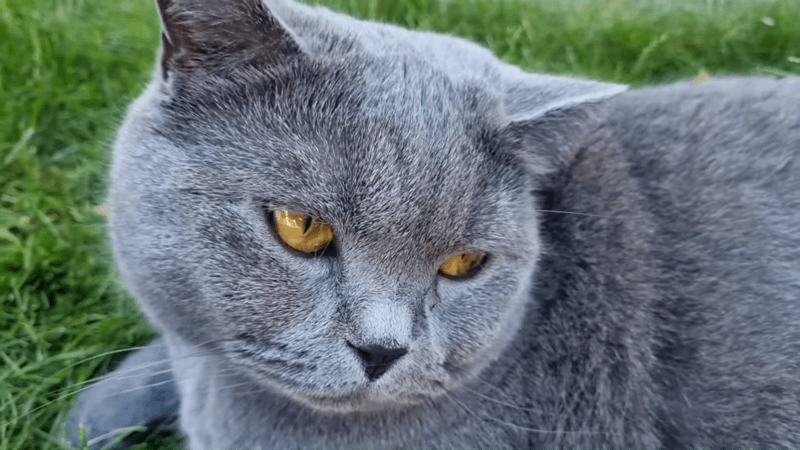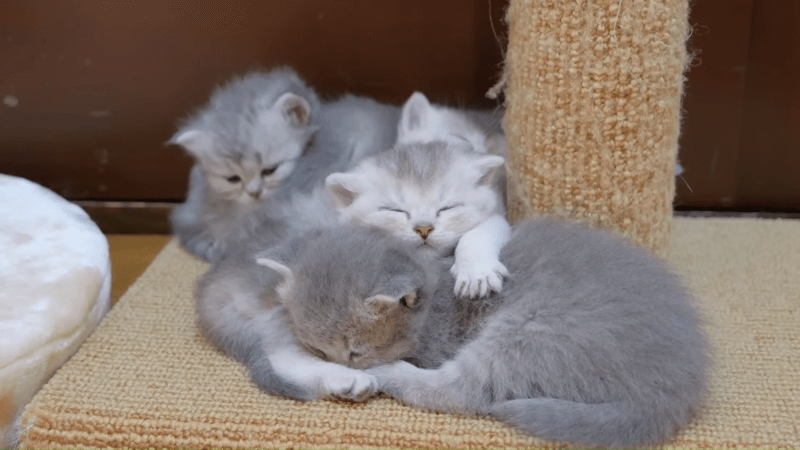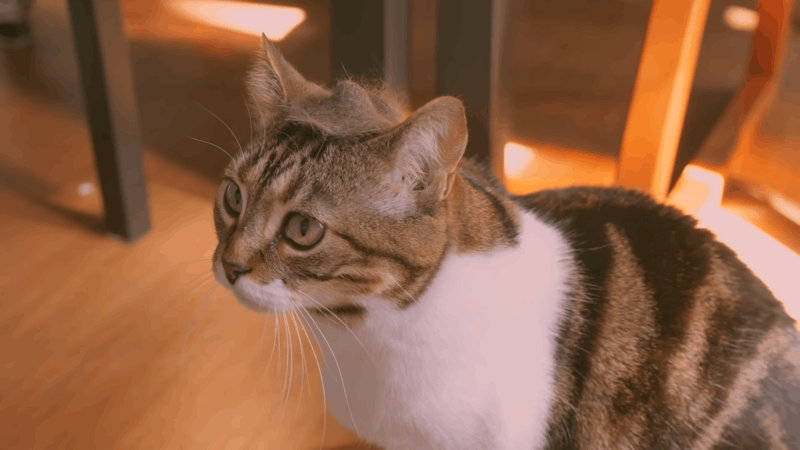No products in the cart.
Recognizing the signs of a constipated cat is crucial for cat owners to ensure their feline companions’ well-being and digestive health. Understanding these signs is essential to taking appropriate action and seeking veterinary advice to alleviate constipation and prevent potential complications.
In this blog, we will explore the signs of a constipated cat, its impact on a cat’s health, and effective strategies to address this issue, including potential considerations regarding the use of CBD.
Signs of a Constipated Cat
- Infrequent or no bowel movements: Constipated cats may have less frequent bowel movements than usual or may not be able to pass any stool at all.
- Straining or difficulty passing stool: When cats are constipated, they may spend an extended amount of time in the litter box, straining and struggling to have a bowel movement.
- Small, dry, or hard feces: The stool of a constipated cat will typically be dry, small, and hard. It may resemble small pellets or be shaped like tiny rocks.
- Lethargy or decreased activity: Cats with constipation may exhibit lethargy or a decrease in their normal level of activity. They may seem less interested in playing or engaging in their usual routines.
- Loss of appetite: Constipated cats often experience a decrease in appetite. They may show disinterest in their food or eat smaller amounts than usual.
- Abdominal discomfort or bloating: Constipation can cause discomfort in a cat’s abdomen. They may exhibit signs of discomfort such as restlessness, pacing, or vocalizing when touched around the abdominal area. The abdomen may also appear bloated or distended.
- Vomiting (in severe cases): In severe cases of constipation, the cat’s digestive system may become backed up, leading to vomiting. This is a sign of a more serious condition and requires immediate veterinary attention.

What Is Cat Constipation?
Cat constipation refers to a condition in which a cat has difficulty passing stool or has infrequent bowel movements. It occurs when the feces in the cat’s colon become dry and hard, making it difficult for them to pass through the rectum. The normal passage of stool is hindered, leading to discomfort and potential complications.
Cat constipation refers to a condition in which a cat has difficulty passing stool or has infrequent bowel movements. It occurs when the feces in the cat’s colon become dry and hard, making it difficult for them to pass through the rectum. The normal passage of stool is hindered, leading to discomfort and potential complications.
Cause of Cat Constipation
The causes of cat constipation can vary and may include:
- Inadequate hydration: Constipation can result from cats’ inadequate hydration, which can cause them to pass dry, hard feces.
- Low-fiber diet: A diet lacking sufficient fiber can result in reduced bulk and motility of the feces, contributing to constipation.
- Lack of exercise: A cat’s digestive tract can be impacted by insufficient exercise, which can also slow down bowel motions and cause constipation.
- Hairballs: Cats groom themselves and ingest hair, which can accumulate in the gastrointestinal tract and cause blockages, leading to constipation.
- Enlarged or impacted anal glands: When the anal glands do not empty properly, they can become enlarged or impacted, causing discomfort and difficulty in passing stool.
- Underlying medical conditions: Certain health issues, such as intestinal blockages, pelvic injuries, neurological problems, or metabolic disorders, can contribute to constipation in cats.
How Cat Health Is Affected
Cat constipation can have various effects on a cat’s health:
- Discomfort and pain: Constipation can cause gastrointestinal pain and discomfort, which makes the cat agitated and restless. They may show signs of discomfort such as vocalizing, pacing, or straining in the litter box.
- Appetite loss: Cats with constipation may experience a decreased appetite or even refuse to eat. The discomfort and altered bowel movements can lead to a loss of interest in food.
- Dehydration: If constipated cats avoid drinking water, it can lead to dehydration. Lethargy, sunken eyes, dry gums, and other indications of dehydration linked to inadequate fluid intake may be present in dehydrated cats.
- Megacolon: Prolonged or chronic constipation can result in a condition called megacolon. This is when the colon becomes abnormally enlarged and loses its ability to contract effectively, leading to further difficulties in passing stool.
- Fecal impaction: a disorder brought on by severe constipation, occurs when the colon is completely blocked. This is an urgent medical situation that needs veterinarian care. Severe discomfort, abdominal distention, appetite loss, and vomiting are among the potential side effects of fecal impaction.
What Can I Give My Constipated Cat?
There are a few things you can do to help alleviate your cats’ condition:
- Increase water intake: Make sure your cat always has access to clean water. Some cats prefer running water, so using a water fountain can encourage them to drink more. You can also try adding water to their food or offering wet food, which has a higher moisture content compared to dry kibble.
- Dietary fiber: Adding specific types of fiber to your cat’s diet can help promote regular bowel movements. This can be accomplished by giving the cat commercial high-fiber cat food or by giving it low-fat, high-fiber psyllium husk powder or pumpkin puree. Always speak with your vet to determine the right kind and amount of fiber for your cat.
- Laxatives or stool softeners: Your veterinarian may recommend using mild laxatives or stool softeners, but it’s crucial to consult them first before administering any medication. They can prescribe suitable options or advise on the correct dosage for your cat.
- Regular exercise: Encouraging your cat to engage in physical activity can help stimulate its digestive system and promote regular bowel movements. Play with your cat using toys that encourage movement or provide climbing structures for them to explore.

What to Do When a Cat Is Constipated
There are several steps you can take to help alleviate the condition of your cats:
- Consult a veterinarian: If your cat is experiencing constipation, you need to get medical attention. They can evaluate the condition’s severity, identify any underlying causes, and offer suggestions for the most effective therapeutic approach.
- Increase water intake: Ensure that your cat has access to fresh water at all times. You can try offering wet food or adding water to their dry food to increase their overall water intake. Some cats may prefer running water, so using a water fountain can encourage them to drink more.
- Dietary adjustments: Your veterinarian may recommend dietary changes to help soften the stool and promote regular bowel movements. This may entail providing a high-fiber diet or including fiber-rich items in their meals, such as pumpkin puree (not pumpkin pie filling). However, always follow your veterinarian’s advice and guidelines when making dietary adjustments.
- Laxatives or stool softeners: In some cases, your veterinarian may prescribe mild laxatives or stool softeners to help alleviate constipation. These should only be given under veterinary guidance to ensure proper dosage and effectiveness.
- Enemas or manual removal: In severe cases of constipation, your veterinarian may need to administer enemas or manually remove the impacted stool. These procedures should only be performed by a veterinary professional.
- Regular exercise: Encourage your cat to engage in physical activity. Play with them using interactive toys or provide opportunities for climbing and exploring. Exercise can help stimulate their digestive system and promote regular bowel movements.
Can CBD Cause Constipation?
The effects of CBD (cannabidiol) on constipation in cats have only been the subject of a small amount of scientific study. Constipation is not a frequently reported side effect of CBD in people or animals, but it should be noted. Some studies suggest that CBD may have potential benefits for gastrointestinal health and motility. However, individual reactions to CBD can vary, and it’s important to monitor your cat closely for any changes in bowel habits or digestive issues when using CBD products. At Pet CBD Club, you may find even more incredible CBD products for your pets.

CBD’s Potential Effects on Digestion
There is evidence to suggest that cat CBD may have several beneficial effects:
- Anti-inflammatory properties: CBD has shown anti-inflammatory effects that may help lessen inflammation in the digestive tract. Intestinal inflammation can exacerbate both irritable bowel syndrome (IBS) and inflammatory bowel disease (IBD).
- Regulation of gut motility: CBD may influence gut motility, which refers to the movement of the digestive system. Studies have suggested that CBD can have both relaxing and contracting effects on the smooth muscles of the gastrointestinal tract, potentially helping to regulate bowel movements.
- Pain relief: CBD has been studied for its pain-relieving properties. It may help alleviate abdominal pain and discomfort associated with digestive issues, such as IBD or abdominal cramping.
- Anxiety and stress reduction: CBD has shown potential for reducing anxiety and stress, which are known to affect digestive function. By promoting a sense of relaxation, CBD may indirectly help improve digestion and reduce symptoms like bloating or indigestion.
Impacts of CBD on Gastrointestinal Function
CBD (cannabidiol) has been studied for its potential impact on gastrointestinal function. While research is still ongoing, here are some ways CBD may affect the gastrointestinal system:
- Regulation of inflammation: CBD has demonstrated anti-inflammatory characteristics, which may help lessen inflammation in the gastrointestinal tract. Conditions like inflammatory bowel disease (IBD) or gut inflammation may benefit from this.
- Modulation of gut motility: The movement of the digestive system, or gut motility, is complicatedly impacted by CBD. It may influence bowel motions and lessen symptoms of disorders like irritable bowel syndrome (IBS) by relaxing and contracting the smooth muscles of the digestive system.
- Pain relief: The analgesic (pain-relieving) qualities of CBD have been researched. It may help alleviate abdominal pain and discomfort associated with gastrointestinal disorders, including IBD and IBS.
- Reduction of nausea and vomiting: CBD has shown promise in reducing nausea and vomiting, which can be symptoms of various gastrointestinal conditions or side effects of certain treatments.
- Modulation of appetite: CBD may influence appetite regulation, potentially stimulating appetite in cases of decreased appetite or suppressing it in cases of excessive appetite, such as in obesity.
Precautions When Using CBD
It’s crucial to take the following precautions when using CBD:
- Consult with a healthcare professional or veterinarian: It is advised to get advice from a doctor or veterinarian before using CBD. They can advise you on dosage recommendations, possible drug interactions, and whether CBD is a good choice for your particular circumstances.
- Quality and source of CBD products: Choose CBD products from reputable manufacturers that provide third-party lab testing to ensure quality and purity. Look for products that are derived from organic hemp and are free of harmful additives or contaminants.
- Start with low doses: When starting CBD, begin with a low dose and gradually increase as needed. This allows you to assess how your body or your pet’s body responds to CBD and helps minimize the risk of potential adverse effects.
- Monitor for side effects: CBD is generally safe for animals, however, some cats may experience negative effects like tiredness, dry mouth, or changes in appetite. If any negative effects appear, lower the dosage or stop using the product.
- Potential drug interactions: CBD can interact with certain medications, including those metabolized by the liver. It’s important to discuss any existing medications with your healthcare professional to assess potential interactions or contraindications.
- Individual variations: Every person or animal may respond differently to CBD. Factors such as age, weight, metabolism, and underlying health conditions can influence the effects and dosage requirements. Adjust CBD usage accordingly and monitor for individual responses.
- Legal considerations: Check the legal status of CBD in your country or region. CBD laws can vary, and it’s essential to ensure compliance with local regulations.
Conclusion
It is important to recognize the signs of a constipated cat and seek veterinary advice to determine the best course of action. Increasing water intake, providing a high-fiber diet, and encouraging exercise can help alleviate constipation.
Always get medical advice before using CBD, select high-quality products, begin with small doses, and keep an eye out for any negative effects or drug interactions. Additionally, be aware of the legal considerations surrounding CBD in your region.
I am Nelson Cooper, I pursue my passion for writing and my belief is that cats love humans. I enjoy traveling and have a deep appreciation for the beauty of nature, as well as a soft spot for animals, particularly cats.



